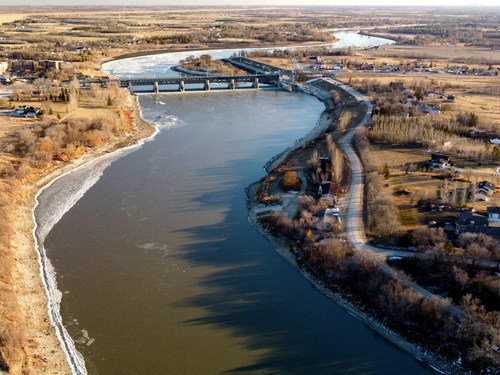OTTAWA, ON and WASHINGTON, Nov. 9, 2022 /PRNewswire/ – To continue improving water quality in the Red River basin, including downstream in Lake Winnipeg, the governments of Canada and the United States approved four additional water quality objectives to be monitored by the International Red River Watershed Board (IRRWB) following a recommendation by the International Joint Commission (IJC). These additional, non-regulatory water quality objectives are for the key nutrients phosphorus and nitrogen.
Excessive nutrients such as phosphorus and nitrogen increase the frequency and severity of algal blooms, one of the biggest water quality challenges facing the Red River watershed and Lake Winnipeg.
The Red River travels north from its headwaters in Minnesota and South Dakota, across the international boundary and flows downstream into Lake Winnipeg in Manitoba.
Establishing objectives and targets for phosphorus and nitrogen levels and loads in the Red River, along with the other water quality objectives, allows the IRRWB to identify changes in water quality trends over time; essential information to improve water quality and reduce the occurrence of harmful algal blooms in the basin.
Following work by federal, state and provincial agencies, significant collaboration through the IRRWB and a number of IJC-funded studies which suggested a significant portion of those nutrients entering Lake Winnipeg come from the Red River, the IJC made (in May 2020) the recommendation to governments that they approve these additional nutrients objectives and targets.
Individuals interested in the IRRWB’s work should visit their website for more information: ijc.org/en/rrb
Quotes
“I want to thank both governments for approving the IJC-recommended objectives for the Red River basin. The monitoring of phosphorus and nitrogen is key to limiting excess nutrients in the basin.”
Pierre Béland, Commissioner and Canadian Chair
“This is excellent news that will enable the International Red River Watershed Board to work with all our partners to improve water quality in the Red River basin. I welcome this decision and thank the Board for their continued commitment to ecosystem health in the basin.”
Rob Sisson, Commissioner and Acting United States Chair
Quick Facts
- The Red River basin occupies substantial portions of North Dakota, northwestern Minnesota, southern Manitoba and a very small portion of northeastern South Dakota. It covers 116,500 square kilometers or 45,000 square miles, excluding the Assiniboine River basin, which joins the Red River at Winnipeg.
- The concentrations, or specific levels of total phosphorus and nitrogen in the water, would best be limited to 0.15 milligrams per liter (0.15 parts per million) and 1.15 mg/l (1.15 ppm), respectively. The loading targets (i.e. amount of nutrients in the river passing by the international boundary) are 1,400 tons/year for phosphorus and 9,525 tons/year for nitrogen.
- In addition to monitoring phosphorus and nitrogen levels, five other water quality objectives were previously established for the Red River and are monitored by the IRRWB. They are: Total Dissolved Solids (TDS), Dissolved Oxygen (DO), Chloride (Cl), Sulphate (SO4), and E. coli.
- The IRRWB’s responsibilities are outlined in the Directive to the International Red River Watershed Board.
- The IJC is an independent body established by the Boundary Waters Treaty of 1909 to help the governments of Canada and the United States prevent and resolve disputes over use of the waters shared by the two countries. It officially designated the IRRWB as an international watershed board in August 2021.
Associated Links
SOURCE International Joint Commission

